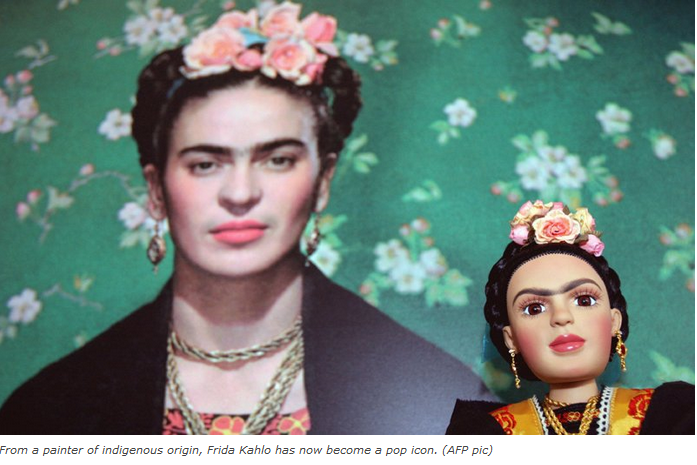“Carlos Dorado, head of multiple companies in fashion, real estate and commerce, and his niece Isolda Pinedo Kahlo created, in 2004, the Frida Kahlo Corporation (FKC), a company based in Florida that owns all the commercial rights to her image,” we learn in “Féminisme Washing.” From her small village of Coyoacan, since merged with Mexico City, the painter has gone on to become an American multinational.
CARLOS DORADO
freemalaysiatoday.com/DICIEMBRE 2021-12-17
PARIS: Graphic and colourful, Frida Kahlo has become a favourite accessory of our home interiors.
However, in many respects, the woman who became an icon of feminism is a far cry from the sleek and stylised image selling in stores or online for a few dollars.
Accomplished artist, openly bisexual and married to a man 20 years her senior, Frida Kahlo represents the strong woman, a fighter despite her physical disability, independent and breaking with social conventions.
In short, Frida bears all the values of feminism, without any of the clichés. Except that, on closer inspection, she has also, somewhat ironically, become a pop icon.
The subject of “Fridamania” is not new.
Already in 2018, at the time of the release of “Frida Barbie,” the contradiction between the polished image of the Mattel doll, in contrast with the life of the Latina artist, caused controversy.
In her recent book “Féminisme Washing,” French journalist and author Léa Lejeune throws a new spotlight on what lies behind the commercial exploitation of feminist values by brands.
A contradiction
From a painter of indigenous origin, the artist has gone on to become a pop icon.
“It looks like an unimaginative Christmas catalogue: postcards, fridge magnets, sneakers, dishes, jewellery, suitcases, planters or bath towels… From €5 to €200, there is something for everyone.
eBay lists 87,000 items related to Frida Kahlo and Amazon 50,000. She is also in vogue on the craft site Etsy with 16,500 hits,” notes the journalist.
Is the commercial craze for Frida so disturbing?
For Lea Lejeune, this image that has become “mainstream,” in the same way as Madonna, would not be dramatic if it were not in total contradiction with the values and life of the Mexican artist: “Is it not ironic to put the face of the artist on a bottle of tequila when she had problems with alcoholism?
How can you sell yoga pants with the image of someone who had her leg amputated at the end of her life?”
Frida Kahlo Corporation
When she died in 1954, Frida was not yet a star. She was certainly recognised as a strong Latin artistic figure, but it was not until the early 2000s with the release of the eponymous film starring Salma Hayek that she was projected into the spotlight.
And while her artworks were left to her husband Diego Rivera, her name, signature and image were trademarked by her family.
“Carlos Dorado, head of multiple companies in fashion, real estate and commerce, and his niece Isolda Pinedo Kahlo created, in 2004, the Frida Kahlo Corporation (FKC), a company based in Florida that owns all the commercial rights to her image,” we learn in “Féminisme Washing.” From her small village of Coyoacan, since merged with Mexico City, the painter has gone on to become an American multinational.
And the timing of the firm’s creation is far from coincidental, since it came just after the release of the film directed by Julie Taymor.
The FKC plays a fundamental role in the image of Frida Kahlo, since any company that wants to commercialize a product must go through this corporation.
“Never apologize for who you are”
Another problem tackled by the author is the altered image used in merchandise relating to the artist. It has been erased and smoothed by the brands that use it, to fit with more current criteria.
Thus, the unibrow and the mustache that she proudly wore have been stylized and toned down. Her skin tone has also been lightened.
But this aesthetic and political makeover has not escaped everyone’s attention.
In 2019, the launch of an Ultra Beauty makeup range, with a watered-down Frida and accompanied by the slogan “Never apologize for who you are,” caused an outcry on the web.
The firm vaguely justified this by stating that the images used were original and not retouched, including the famous eyebrow. Still, it’s a justification that, at first glance, seems somewhat perplexing…
‘Confirmation bias’
Despite the online protests of some committed consumers, the opposition between Frida’s watered-down image and her atypical life – worlds apart from that of a Barbie (after all, Frida was, for a time, Trotsky’s mistress) – is not so straight-forward.
Léa Lejeune sees a “confirmation bias,” where “each of the people who consume this reconstructed character sees a confirmation of their lifestyle and their subaltern beliefs by unconsciously obliterating the rest.”
An opinion shared by Sylvie Borau, Marketing professor at the Toulouse Business School, interviewed by the Inrockuptibles on the subject: “Frida had a side [that said] ‘I don’t care about my appearance’ by refusing to wax for example, but at the same time she was very elegant and wore makeup. It is contradictory! She was in this duality [and] that is a trend that is coming back in force today.”
Would the communist Frida have appreciated this consumerist craze around her image? Perhaps, perhaps not. Either way, she still adorns many a living-room wall.






